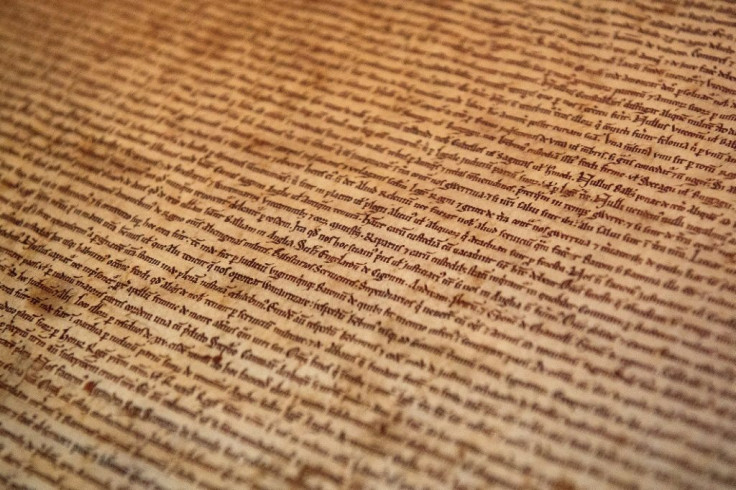No, Magna Carta Does Not Allow Firms To Defy Covid Curbs
Does Magna Carta supersede England's coronavirus regulations and allow businesses to stay open during lockdowns? In a word, no, but a handful of firms have been standing on their own interpretation of ancient liberties.
Invoking the landmark English charter of 1215, one hairdresser near Bradford in northern England has become a cause celebre among social media libertarians after stacking up fines totalling ?17,000 ($23,000).
Sinead Quinn has been posting regular Instagram updates of her confrontations with council officials and the police, as the fines mount for keeping her salon open this month despite a nationwide shutdown.
"I don't consent to any fine," she told one officer in a video earlier this month. "I'm not breaking any law. I'm operating my business under the common law."
In another post, Quinn quoted "article 61" of Magna Carta to buttress her belief that "we have a right to enter into lawful dissent if we feel we are being governed unjustly".
The hairdresser is not alone. Among others invoking Magna Carta to stay open have been a tattoo parlour in Bristol, western England, and a children's soft-play centre in Liverpool, in the northwest.
In all the cases, law enforcers have taken a dim view, meting out fines and reminding all businesses that legislation of this year, not 800 years ago, is relevant and binding.
Kirklees Council said the actions of Quinn Blakey Hairdressing were "selfish and irresponsible", in a month when all of England was under lockdown to try to arrest a second wave of Covid-19.
If Quinn does not pay up and back down, a council spokesperson told AFP she faces "eventually prosecution".
In Liverpool, video of a standoff at the soft-play centre showed a police officer telling the owner: "Obviously, the Magna Carta didn't know about Covid-19."
Self-appointed guardians of constitutional precedent are not wrong in pointing to Magna Carta as laying down important principles in English common law.

In June 1215, the despotic King John accepted the demands of rebellious barons and agreed to a densely written legal document in Latin spelling out curbs on his powers.
Magna Carta -- "The Great Charter" -- declares that justice should be available to all, the law applies equally, and monarchs can only exercise power in accordance with the law.
Those principles have formed the basis of legal systems across the globe, the Universal Declaration of Human Rights, and the US constitution.
But back in medieval England, the original charter was soon flouted by King John, civil war was renewed, and the vast majority of clauses never translated into later versions that did form the canon of English law.
Only four clauses survive in law to this day, including "habeas corpus" (forbidding arbitrary detention) and a right to trial by jury, according to the British parliament's website.
Clauses that never reached English statute include 61, which gave the right of resistance to 25 named barons, should the king infringe on their liberties. At no point did Magna Carta give any right to rebel to the populace at large.
Human rights lawyer Adam Wagner offered a word of caution to anyone relying on online conspiracy theories and legal hokum to evade coronavirus curbs.
He noted one case where a car thief, in court, relied on Magna Carta to try to get off after reading "ridiculous nonsense he had printed off from the internet".
"Suffice to say he was convicted and sent to prison for a number of years," Wagner tweeted.
In July, a British man was jailed for four years, not for trying to rely on Magna Carta but attempting to steal one of only four original versions of the document from Salisbury Cathedral.
Sinead Quinn will get her wish next week, when the England-wide lockdown ends. While her region in Yorkshire will remain in the highest tier of coronavirus restrictions, "personal care" businesses can reopen.
© Copyright AFP 2024. All rights reserved.





















